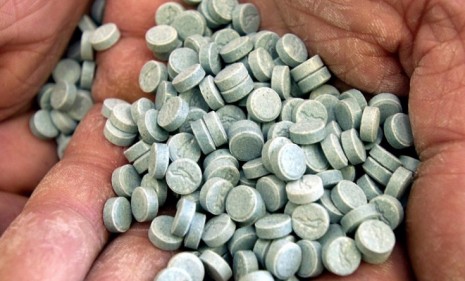Can party drug ecstasy cure cancer?
Scientists are excited after a preliminary study shows that modified forms of the euphoria-inducing party drug can wipe out cancer cells

A free daily email with the biggest news stories of the day – and the best features from TheWeek.com
You are now subscribed
Your newsletter sign-up was successful
Ecstasy, the recreational drug associated with dance clubs and all-night raves, may have some medicinal uses, too. Scientists report in the journal Investigational New Drugs that chemically altered ecstasy, also known as MDMA, was able to suppress the growth of blood-cancer cells. Though the results are preliminary, experts are calling this discovery "genuinely exciting." Here, a brief guide:
Ecstasy can really fight cancer?
Yes. In fact, it’s been known for years that ecstasy and other psychoactive drugs like antidepressants are able to stop the growth of cancer cells. But in order to be effective, the doses needed would be massive enough to kill a person. By chemically re-engineering the drugs, scientists were able to develop variants that are 100 times more effective at fighting cancer – lowering the necessary dosage, and making treatment safer.
The Week
Escape your echo chamber. Get the facts behind the news, plus analysis from multiple perspectives.

Sign up for The Week's Free Newsletters
From our morning news briefing to a weekly Good News Newsletter, get the best of The Week delivered directly to your inbox.
From our morning news briefing to a weekly Good News Newsletter, get the best of The Week delivered directly to your inbox.
What kinds of cancer are affected?
Right now, scientists are looking at cancers like leukemia, lymphoma, and myeloma, all of which affect blood cells. The modified drugs are attracted to the fats that make up the walls of these cancer cells; once the cell walls are broken down, the cancer cells are killed. "This is in the test tube – it could be different in the patient," says researcher John Gordon of the University of Birmingham in the U.K., as quoted by BBC News, "but for now it's quite exciting."
Is ecstasy really a cancer cure?
Not exactly. The chemically altered drugs researchers are looking at are distinctly different from recreational ecstasy. Also, the drugs need to be tested in animals and in humans to determine if they’re safe and effective, so any breakthroughs are still years away. Still, experts like Dr. David Grant of the charitable group Leukemia and Lymphoma Research are calling this a real step forward. "The prospect of being able to target blood cancer with a drug derived from ecstasy is a genuinely exciting proposition," Grant says.
A free daily email with the biggest news stories of the day – and the best features from TheWeek.com
Sources: BBC News, International Business Times, Medical News Today
-
 Colbert, CBS spar over FCC and Talarico interview
Colbert, CBS spar over FCC and Talarico interviewSpeed Read The late night host said CBS pulled his interview with Democratic Texas state representative James Talarico over new FCC rules about political interviews
-
 The Week contest: AI bellyaching
The Week contest: AI bellyachingPuzzles and Quizzes
-
 Political cartoons for February 18
Political cartoons for February 18Cartoons Wednesday’s political cartoons include the DOW, human replacement, and more